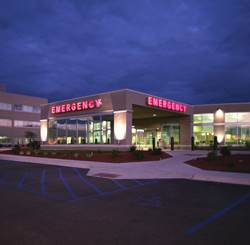
Emergency Services
If you are having a medical emergency, please call 911.
Hannibal Regional Hospital offers emergency room services 24 hours per day, seven days a week. Inside the Emergency Department, our nurses are specially trained in advanced cardiac life support and our physicians are board-certified in emergency medicine. We offer rapid medical evaluations to patients entering our Emergency Department.
Conditions treated in the Emergency Department include:
- Emergency Medicine
- Acute behavioral health problems
- Asthma and other breathing emergencies
- Athletic, playground, workplace or school-related accidents
- Back pain
- Bone and joint injuries
- Emotional distress
- Falls
- Heart attack/chest pain
- Injuries caused by violence
- Poisoning
- Severe pain and/or bleeding
- Stroke
- Traumatic injury
The Emergency Department is prepared to handle your emergencies with a technologically advanced monitoring system and on-staff cardiologists who have the capability to monitor EKG results from a remote location.
Whether you are experiencing a minor emergency or a life-threatening situation, our team can provide the emergency care you need. We have easy access and convenient parking just off of Emergency Drive at the main hospital complex.
For more information call 573-248-1300.
Level III Stroke Center Designated
Hannibal Regional Hospital is a designated Level III Stroke Center by the Missouri Department of Health and Senior Services as a component of the Time Critical Diagnosis System throughout the state.
Missouri has designated 43 Stroke Centers, the newest component of the Time Critical Diagnosis (TCD) System, throughout the state. The state-wide Time Critical Diagnosis (TCD) System brings together the 911 response system, ambulance services and hospitals in a coordinated way to provide patients the right care, at the right place, in the right amount of time. With designated Stroke Centers in place, individuals suffering a stroke will receive quicker response times that may lead to improved survival and recovery rates.
Designations are granted after a thorough review by a survey team consisting of a Stroke Coordinator or Stroke Program Manager, one Emergency Medicine physician, one or two Neurologist(s)/Neuro-Interventionalist(s,) all with experience in stroke, and one representative from the Department of Health and Senior Services.